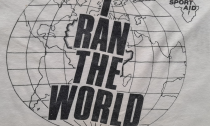
In 1986, just one year after Live Aid shook the world, another global event took place—one that mobilised 20 million people in 89 countries, raised $35 million, and helped cancel $150 million in African debt. It was called Sport Aid. Yet today, it’s been all but erased from public memory.
The BBC’s recent documentary on the 40th anniversary of Live Aid honours the cultural power of that moment. But in its final episode, it attributes Bob Geldof’s honorary knighthood solely to Band Aid and Live Aid. That’s simply not accurate. Geldof’s KBE came after Sport Aid—not as a continuation of Live Aid, but as a radical evolution of it.
I am not only the founder of earthdive, I also founded and organised Sport Aid with a different ambition. While Live Aid had spectacle, I wanted substance. Sport Aid wasn’t about watching—it was about acting. We created a way for ordinary citizens across the globe to directly pressure world leaders into action.
A young African runner lit a torch from a refugee camp fire. That torch passed through Europe, met heads of state, and arrived at the United Nations in New York. On the eve of the first-ever UN Special Session on Africa, he lit a beacon. At that moment, people in 274 cities in 89 countries began to run. It was called Run the World. Millions did.
This was activism in motion—long before “activism” became a buzzword. We made the fight against famine global, participatory, and political. Yet the BBC documentary omits all of this. The irony is painful.
In the early days, Bob Geldof wanted to pull out of Sport Aid, concerned it might dilute the Band Aid brand. The Band Aid Trust officially withdrew from the project via an email to the Birmingham NEC. Only after I personally challenged him did they return—after UNICEF became involved and media interest had already taken off.
Even then, tensions remained. Geldof was scheduled to appear in New York to receive the torch from our African runner. He didn’t turn up. That same day, Hands Across America, organised by Ken Kragen in the US, competed for public attention. Geldof helped Kragen with publicity. It was a missed opportunity—perhaps the moment to hand the baton from celebrity charity to political action.
That moment came and went.
Yet Sport Aid proved the public appetite for something more than concerts and compassion. It showed that millions would show up not just to watch—but to demand change. It also provided the first serious test of whether this kind of global, coordinated citizen action could influence policy. It did.
So why has it been left out?
Perhaps because it doesn’t fit the narrative. It wasn’t led by rock stars. It didn’t climax with a stage performance. But that doesn’t make it any less historic.
The Queen’s private office contacted me directly after the success of Sport Aid to ask whether Geldof would accept the KBE. It was awarded not just for Band Aid and Live Aid, but also for what came after—for the 130 young people in a London office who helped build a global movement, and the 20 million who ran for Africa.
As we mark 40 years since Live Aid, we must remember more than just the stars and the songs. We must remember the scale of what was possible—and what was achieved.
The world didn’t just sing for Africa. One day in May 1986, the world ran for it too. And that deserves to be remembered.
Chris Long MBE
Founder of Earthdive
Founder and Chairman of Sport Aid and Run the World











Social Profiles